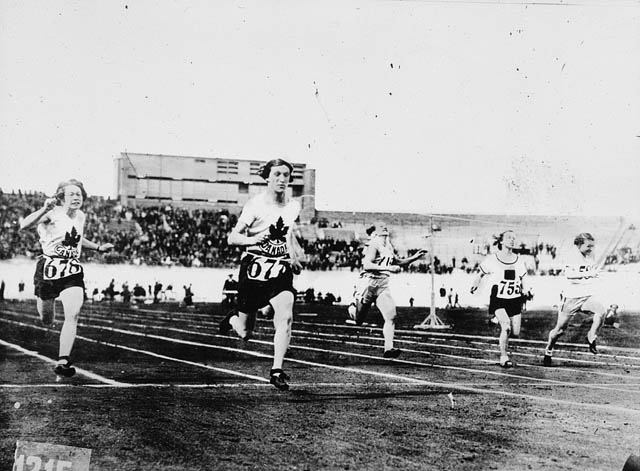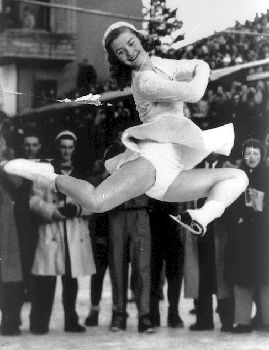The Canadian Olympic Committee (COC) is the organization responsible for Canada’s participation at the Olympic Games, Pan American Games, and Youth Olympic Games. It helps select and financially assist Canadian cities in their efforts to host an Olympic Games or Pan American Games. It also manages programs that promote the values of the Olympics throughout Canada. The organization, which was known as the Canadian Olympic Association (COA) from 1912 to 2002, has a staff of more than 100 people. Its offices are in Toronto, Montreal and Vancouver.

Background and Origin
Canada first participated at the second Olympiad, the 1900 Olympic Games in Paris, and then four years later at the 1904 Olympic Games in St. Louis. (See also George Orton: Canada’s First Olympic Champion.) Following the first Olympic Games in North America, the Canadian Olympic Committee was established. However, it was not officially recognized by the International Olympic Committee (IOC) as an official national Olympic committee until 1907, one year prior to the 1908 Olympic Games in London.
In 1907, Governor General Sir Albert Grey was asked by the British Olympic Committee to organize a Canadian Olympic team for the Olympic Games that London would host the following year. Grey appointed Colonel John Hanbury-Williams to be in charge. Hanbury-Williams obtained the assistance of Ottawa Evening Journal publisher Philip Dansken Ross, who was a trustee for the Stanley Cup, and Reverend D. Bruce MacDonald, who was the former president of the University of Toronto Athletic Association.

In preparing for the Olympic Games, Canada’s Amateur Athletic Union (AAU) and the Amateur Athletic Federation of Canada could not agree on the definition of “amateur.” The sides came to an agreement during an amicable luncheon in Ottawa on 30 November 1907, and the trials for a Canadian Olympic Team were determined. In 1911, Hanbury-Williams was named a member of the International Olympic Committee.
Following the 1912 Olympic Games in Stockholm, where Canada won eight medals, a permanent committee to organize Canadian Olympic teams — the Canadian Olympic Association (COA) — was formed. It initially functioned within the AAU. (See also Amateur Sports Organization.)
The 1916 Olympic Games in Berlin were cancelled due to the First World War. But during the 1910s, COA chairman James Merrick remained busy. He helped organize demonstration sports for the Olympic Games and was instrumental in initiating the Olympic Winter Games, which were first held in 1924 in Chamonix, France. Men’s ice hockey and figure skating were part of the 1920 Olympic Summer Games in Antwerp. The Winnipeg Falcons, representing Canada, won gold in men’s hockey, outscoring their opponents 29–1.
1928 Success
In 1926, the Women’s Amateur Athletic Federation of Canada was formed. It pressured the AAU to enter female athletes at the Olympic Games. The 1928 Olympic Games in Amsterdam are considered a historic Olympic Games for Canada, especially in terms of women’s events. The women’s track and field team, which included sprinter Bobbie Rosenfeld and high jumper Ethel Catherwood, was dominant. In all, Canadian women won four medals in athletics. Meanwhile, Percy Williams was the fastest man, winning gold in the men’s 100 m and 200 m.

1930s and 1940s
In 1932, most Canadian athletes had to pay their own way to the Olympic Games because the COA did not have much revenue due to the Great Depression. Luckily, the Olympic Games were held in the United States; Los Angeles hosted the Summer Games, and Lake Placid hosted the Winter Games.
In 1936, the Olympic Winter Games and Olympic Summer Games took place in Germany. Politics dominated the headlines. That the COA even sent a team at all was considered controversial because of Germany’s discriminatory treatment of Jewish people.
The 1940 and 1944 Olympic Games were cancelled due to the Second World War. After that, Canadian sport experienced a decline. The AAU did not have the resources to help Canadian sport; in 1949, it became independent from the COA. After the WAAF was disbanded in 1953, female sport was strongly discouraged. Despite this, a Canadian star emerged at the 1948 Olympic Winter Games in St. Moritz as Barbara Ann Scott won gold in women’s figure skating.

Greater Emphasis on Amateur Sport
Canada won only 34 Olympic medals from 1952 to 1968. According to Bruce Kidd of the University of Toronto, the COA in the 1950s acted more like a travel agency, doing little more than helping athletes get to the Games.
Attitudes changed in the 1960s. The Fitness and Amateur Sport Act was passed by John Diefenbaker’s Conservative government, while the National Sport and Recreation Centre was created by Lester Pearson’s Liberal government. The COA was put in charge of financial athlete assistance programs for the Olympic Games in 1972 and 1976, through a program called Game Plan.
Hosting Olympic Games in Canada
The COA was active in assisting Montreal and Calgary in their bids to host the Olympic Games. Montreal lost out in its bid for the 1956 Olympic Winter and Summer Games, and the 1972 Olympic Summer Games, before finally being awarded the 1976 Olympic Summer Games. Meanwhile, Calgary bid for the 1964 and 1968 Olympic Winter Games and had an unsuccessful joint bid with Banff for the 1972 Olympic Winter Games before being awarded the 1988 Olympic Winter Games.
Despite efforts by the COA to increase performance, Canada did not win any gold medals at the 1976 Olympic Summer Games in Montreal or at the 1988 Olympic Winter Games in Calgary.

1980 Summer Games Boycott
In 1980, the COA endorsed (in a 137–35 vote) the US-led boycott of the 1980 Olympic Summer Games in Moscow because of the Soviet invasion of Afghanistan. Team Canada returned to the 1984 Olympic Summer Games in Los Angeles and won 44 medals, due in large part to the counter-boycott by the Soviet Union and its allies. (See also Cold War.)
1992–2018: International Excellence
From 1992 to 2018, Canada achieved increasing success in international sport. By working with national sports organizations and Own the Podium (an organization that assists high-performance Canadian athletes), the COA — renamed the Canadian Olympic Committee (COC) in 2002 — is “dedicated to providing athletes with the most comprehensive services available.” In this 26-year-period, Canada won 282 medals. The most significant highlight came at the 2010 Olympic Winter Games in Vancouver (the first Games after the introduction of the Own the Podium program). Canada won 14 gold medals at the Games, a record for one nation at a single Winter Olympics.
Recent Initiatives
Over the last decade, the COC has been involved in numerous initiatives. They have included an Athlete Excellence Fund, the Canadian Olympic School Program (which engages youth with Olympians) and partnerships with LGBTQ2+ organizations.
In 2020, the COC was a leader in persuading the International Olympic Committee to delay the 2020 Olympic Summer Games in Tokyo for a full year due to the COVID-19 pandemic.
COC Presidents
|
President |
Term |
|
John Hanbury-Williams |
1907–11 |
|
James Merrick |
1911–21 |
|
Patrick J. Mulqueen |
1922–46 |
|
Andrew Sidney Dawes |
1947–53 |
|
Ken Farmer |
1953–61 |
|
James Worrall |
1961–68 |
|
E. Howard Radford |
1968–69 |
|
Harold Wright |
1969–77 |
|
Richard Pound |
1977–82 |
|
Roger Jackson |
1982–90 |
|
Carol Anne Letheren |
1990–94 |
|
Wayne Hellquist |
1994 |
|
Bill Warren |
1994–2001 |
|
Michael Chambers |
2001–10 |
|
Marcel Aubut |
2010–15 |
|
Tricia Smith |
2015–present |
See also Amateur Sports Organization; Music at the Olympics; Maclean’s Article: IOC Promises Reforms.

 Share on Facebook
Share on Facebook Share on X
Share on X Share by Email
Share by Email Share on Google Classroom
Share on Google Classroom







